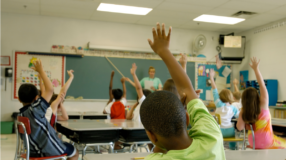While many children thrive in a public school environment, not all students do. That’s why it is important that states give parents the ability to choose the education approach that works best for their children.
Jonathan Lopez’s story is an example of why education choice is essential. Jonathan has Asperger’s Syndrome, and his teachers did not understand how to teach a child with special needs. His classmates bullied him. After continuing to struggle in public school, Jonathan’s parents decided to try home school. His mom is a former teacher, and she knew exactly how to teach a student with his unique needs. Jonathan began to excel under the specialized, individual attention his mother provided.
All parents want their children to receive a quality education that prepares them for college, a career, and life. Sometimes, that’s not through a traditional public school. For millions of children like Jonathan, homeschooling is an excellent education option that puts them on the path to success.
Why do parents choose to homeschool their children?
Parents chose to homeschool their children for a number of different reasons. Top among them is a concern about the environment of other schools. Parents of homeschooled children are often worried about bullying, drugs, or peer pressure their child might experience at school. Parents also note a school’s poor academic performance as a significant factor in their decision to homeschool. Others cite wanting to provide their kids with religious instruction.
How many children in the United States are homeschooled?
There are approximately 2.5 million children in the United States who are homeschooled. That’s about three percent of the school-age population. The popularity of homeschooling has been increasing each year since all 50 states legalized the practice in the 1990s. In 1999, only 850,000 children were homeschooled.
Has homeschooling become more popular after the coronavirus?
After the coronavirus upended America’s education system, most American families experienced homeschooling to some extent. That experience may have improved their perception of home school. A RealClear Opinion Research poll found 40 percent of families are more likely to homeschool after the coronavirus lockdowns end. Research from EdChoice finds more than half of black parents (53%) said they have a more favorable opinion of homeschooling as a result of the pandemic. And research from BestColleges found the number of homeschooled students is expected to increase by 10 percent this school year—from 2.50 million to roughly 2.75 million.
Is homeschooling regulated?
Homeschooling is legal in all 50 states, but each state has different homeschool laws that regulate how parents can homeschool their children. Some states have very restrictive homeschooling rules, such as subject, reporting, and testing requirements, while others are more relaxed. New York, for example, requires parents to send in a notice of intent to homeschool, quarterly reports, and an annual assessment of their child’s progress. Alaska, on the other hand, has no requirements to notify the state, seek approval, test, or file forms. Most states have laws that are somewhere in the middle of these two extremes.
As noted above, some states require a parent to notify the school district of their intent to homeschool their child. Some states make you fill out that notification every year, while others require no notice at all. Twenty-four states require parents to give their homeschooled children annual assessments to ensure they are keeping up with their academics.
Eleven states (Washington, New Mexico, North Dakota, Ohio, Tennessee, Georgia, South Carolina, North Carolina, Virginia, West Virginia, and Pennsylvania) require parents to meet certain educational requirements, like having a high school diploma, to homeschool their children.
Some states have subject and instruction requirements. Colorado, for example, requires homeschooled students to learn communication skills of reading, writing, and speaking, mathematics, history, civics, literature, science, and the US Constitution. Utah has no subject requirements at all.
Find out your state’s homeschool laws here.
Which states have the strictest homeschool laws?
Massachusetts, New York, Pennsylvania, Rhode Island, and Vermont have the most restrictive home school laws.
Which states have the most relaxed homeschool laws?
Alaska, Idaho, Illinois, Indiana, Michigan, Missouri, New Jersey, Oklahoma, and Texas have the least amount of homeschool regulations.
Fast facts on homeschooling
- 3% of all US students are homeschooled.
- The number of homeschooled students is expected to increase by 10 percent this school year—from 2.50 million to roughly 2.75 million.
- Homeschooled children typically score 15 to 30 percentage points higher than public-school students on standardized tests.
- Massachusetts, New York, Pennsylvania, Rhode Island, and Vermont have the most restrictive home school laws.
- Alaska, Idaho, Illinois, Indiana, Michigan, Missouri, New Jersey, Oklahoma, and Texas have the least amount of regulations regarding homeschooling.
Additional Reading on Homeschool Laws
Sparked by Pandemic Fallout, Homeschooling Surges Across US
The Associated Press
Inside Homeschool Policy
Coalition for Responsible Home Education
Homeschooling Experiences and Opinions During the COVID-19 Pandemic
EdChoice
Homeschool Laws By State
Homeschool Legal Defense Association
The Laws Governing Homeschooling
ThoughtCo.
Covid-19 Pandemic Pushes More Parents to Go All-In for Home Schooling
The Wall Street Journal
Video: Pandemic Pioneers—Homeschooling with Leigh Sloan
Alaska Policy Forum
A Case for Education Savings Accounts: Jonathan Lopez’s Story
Beacon Center of Tennessee
National Poll Finds 4 out of 10 Families More Likely to Homeschool After Lockdowns End
Center of the American Experiment
Families Look to Homeschooling as Uncertainty Over Schools Reopening Continues
Center of the American Experiment
Myths & Facts: Homeschooling
Commonwealth Foundation
Private School, Homeschool Families Save Taxpayers Nearly $600 Million
Empower Mississippi
Hybrid Homeschools Offer Families Options Amid Coronavirus Uncertainty
Georgia Public Policy Foundation
Homeschooling Allows Children to Move at Their Own Pace
Goldwater Institute
Pandemic Produces a Strong Increase to NC’s Massive Homeschool Population
John Locke Foundation
Homeschools: The Rock Stars of School of Choice in North Carolina
John Locke Foundation
Utah Parents, it May be Time to Consider Home Schooling
Libertas Institute
Restricting Homeschool Freedom Won’t Make Children Safer
Mackinac Center
How to Homeschool in Mississippi
Mississippi Center for Public Policy
How Many New Homeschoolers Will We Have This Year?
Mississippi Center for Public Policy
Homeschooling in Nevada: The Budgetary Impact
Nevada Policy Research Institute
Online Learning and Homeschooling Options During the COVID-19 Crisis
Pacific Research Institute
SC Homeschool Accountability Groups Report Surge in Homeschooling
Palmetto Promise Institute
My Family Will Home School This Fall. Other Families Should Have Options As Well.
Rio Grande Foundation
Thinking About Homeschooling in Missouri this Year?
Show-Me Institute
Considering Homeschooling? Here’s What Parents With Experience Say
Sutherland Institute
The K-12 Education Opportunity Covid-19 Has Given Us
Texas Public Policy Foundation
Amid Coronavirus Lock-downs, Many Families are Finding that Homeschooling is Better for Their Children
Washington Policy Center










